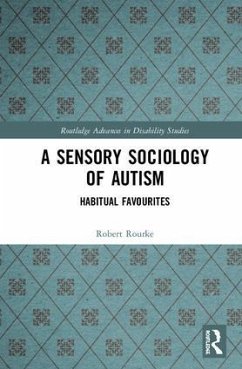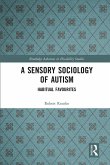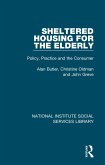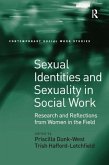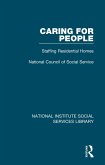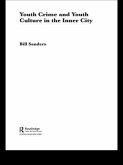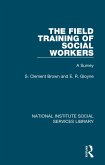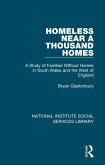- Gebundenes Buch
- Merkliste
- Auf die Merkliste
- Bewerten Bewerten
- Teilen
- Produkt teilen
- Produkterinnerung
- Produkterinnerung
This innovative book places the sensory experiences of autistic individuals within a sociological framework. It instigates new discussions around sensory experience, autism and how disability and ability can be reconceived.
Andere Kunden interessierten sich auch für
![A Sensory Sociology of Autism A Sensory Sociology of Autism]() Robert RourkeA Sensory Sociology of Autism64,99 €
Robert RourkeA Sensory Sociology of Autism64,99 €![Sheltered Housing for the Elderly Sheltered Housing for the Elderly]() Alan ButlerSheltered Housing for the Elderly48,99 €
Alan ButlerSheltered Housing for the Elderly48,99 €![Sexual Identities and Sexuality in Social Work Sexual Identities and Sexuality in Social Work]() Priscilla Dunk-WestSexual Identities and Sexuality in Social Work210,99 €
Priscilla Dunk-WestSexual Identities and Sexuality in Social Work210,99 €![Caring for People Caring for People]() National Council of Social ServiceCaring for People48,99 €
National Council of Social ServiceCaring for People48,99 €![Youth Crime and Youth Culture in the Inner City Youth Crime and Youth Culture in the Inner City]() Bill SandersYouth Crime and Youth Culture in the Inner City74,99 €
Bill SandersYouth Crime and Youth Culture in the Inner City74,99 €![The Field Training of Social Workers The Field Training of Social Workers]() S. Clement BrownThe Field Training of Social Workers47,99 €
S. Clement BrownThe Field Training of Social Workers47,99 €![Homeless Near a Thousand Homes Homeless Near a Thousand Homes]() Bryan GlastonburyHomeless Near a Thousand Homes48,99 €
Bryan GlastonburyHomeless Near a Thousand Homes48,99 €-
-
-
This innovative book places the sensory experiences of autistic individuals within a sociological framework. It instigates new discussions around sensory experience, autism and how disability and ability can be reconceived.
Hinweis: Dieser Artikel kann nur an eine deutsche Lieferadresse ausgeliefert werden.
Hinweis: Dieser Artikel kann nur an eine deutsche Lieferadresse ausgeliefert werden.
Produktdetails
- Produktdetails
- Verlag: Routledge
- Seitenzahl: 184
- Erscheinungstermin: 21. März 2019
- Englisch
- Abmessung: 240mm x 161mm x 15mm
- Gewicht: 446g
- ISBN-13: 9781138491991
- ISBN-10: 1138491993
- Artikelnr.: 55982837
- Herstellerkennzeichnung
- Books on Demand GmbH
- In de Tarpen 42
- 22848 Norderstedt
- info@bod.de
- 040 53433511
- Verlag: Routledge
- Seitenzahl: 184
- Erscheinungstermin: 21. März 2019
- Englisch
- Abmessung: 240mm x 161mm x 15mm
- Gewicht: 446g
- ISBN-13: 9781138491991
- ISBN-10: 1138491993
- Artikelnr.: 55982837
- Herstellerkennzeichnung
- Books on Demand GmbH
- In de Tarpen 42
- 22848 Norderstedt
- info@bod.de
- 040 53433511
Robert Rourke is a Sociology PhD graduate who is interested in social theory, continental philosophy and disability studies. He is particularly interested in reimagining the dis/ability divide and examining how attention to autistic experience can reveal mundane power structures.
Acknowledgements
Chapter 1 - Introduction: Exploring Autism, The Senses and Autoethnography
A Sensory Beginning
Autism Spectrum Conditions - Categorisation and Expanding Definitions
Sociological Imaginations and Forming Habits
Autoethnography as Sociological Imagination
Redefining Autism Through Favourite Quasi-Objects
Notes on Research and Chapter Exercises
Conclusion - Outline of Chapters
Bibliography
Chapter 2 - Sensory Habits as Pragmatic Quasi-Object Relations
Introduction
A Brief Sociological Trajectory Of The Senses
Pragmatic Habits as Mediating Senses
Habitual Favourites as a Concept
Reassessing Sensory Sociology and Habitual Favourites With Autism
Michel Serres, The Parasite and Quasi-Objects
Habitual Favourites as Quasi-Objects - The Sensory Autistic Manifold
Conclusion
Chapter Exercises
Bibliography
Chapter 3 - Habitual Favourites: Modulated Thresholds and Quasi-Objects
Introduction - An Outline of The Chapter
Factors Impacting The Relationships to Favourites in Autism
Developing The Quasi-Object Concept
Some Comments on Using an "Events" Based Analysis
Doug - Cats, Technological Quasi-Objects and Soylent as Parasite
Garry - Multi-Modal Anxiety Relief and Social Management
Josh - Escalator Sickness
Conclusion - Reformulating Parasitical Quasi-Objects
Chapter Exercises
Bibliography
Chapter 4 - An Auto/AutieEthnography Part 1 - Methodological and Researcher Positionality
Introductory Vignette - A Multivocal Discussion of Research
Evocative Uses of Vignettes and Multivocality in Autoethnographic Accounts
A Brief Interlude - Analytic Autoethnography
An Evocative and Post-Structural Commitment to Openness
Autoethnography Concerns and Challenges
The Slippage Between Autoethnography as Narcissistic and Theory of Mind
An Emplaced Concern With Relational Ethics
Autoethnography as Journeying and Pragmatic Balance
Chapter Exercises
Bibliography
Chapter 4.5 Auto/Autieethnography Part 1.5 - Distributed Sociality and Posthuman Disability
Introduction - A Brief Interlude
Beyond Poststructural Autoethnography to Quasi-Object Relationality
PhD Work, Disability Support and Relational Ethics
How Does The Autistic Author Emerge?
Revealing the Analytic Potential in the Academic Mundane
A Concluding Multivocal Discussion
Chapter Exercises
Bibliography
Chapter 5 - An Auto/AutieEthnography Part 2 - Autoethnographic Writing Vignettes
Introduction - Of Writing Vignettes and Autoethnography
Writing Vignette 1 - Writing in Chaos - Autism, Writing and Home Care
My PhD "Writing Day" Exhilaration, Exasperation and Emotional Exhaustion
Discussion - Writing as a Mundane Academic Habitus
The Consequences of Writing in Chaos - Thinking With Care in Writing
How Do You Cope? - Future Directions
Post-PhD Update
Writing Vignette 2 - The "Glow" of Academic Labour
Back to Caring - Intellectual Structures and Identity
Conclusion - Reflecting on a Sociological Imagination
Chapter Exercises
Bibliography
Chapter 6 - Affective Atmospheres: Perturbations and Emplaced Affects
Introduction
What is An Affective Atmosphere?
What Can Be Called an Atmosphere? - Boundaries and Effects
Atmospheric Interstices - Beyond Binaries
Data Analysis - The Material/Spatial Organisation of The Club
Case 1 - Sound, KISS Radio and (Non)-Human Atmospheres
Case 2 - Echolalia, Gestural Semiosis and Blackadder
Conclusion
Chapter Exercises
Bibliography
Chapter 7 - Sensory and Disability Futures
Introduction
Habitual Favourites in Policy and Practice
Multi-Media Sensory Research
Habitual Favourites and Social Categories
The Book as Quasi-Object
Chapter Exercises
Bibliography
Index
Chapter 1 - Introduction: Exploring Autism, The Senses and Autoethnography
A Sensory Beginning
Autism Spectrum Conditions - Categorisation and Expanding Definitions
Sociological Imaginations and Forming Habits
Autoethnography as Sociological Imagination
Redefining Autism Through Favourite Quasi-Objects
Notes on Research and Chapter Exercises
Conclusion - Outline of Chapters
Bibliography
Chapter 2 - Sensory Habits as Pragmatic Quasi-Object Relations
Introduction
A Brief Sociological Trajectory Of The Senses
Pragmatic Habits as Mediating Senses
Habitual Favourites as a Concept
Reassessing Sensory Sociology and Habitual Favourites With Autism
Michel Serres, The Parasite and Quasi-Objects
Habitual Favourites as Quasi-Objects - The Sensory Autistic Manifold
Conclusion
Chapter Exercises
Bibliography
Chapter 3 - Habitual Favourites: Modulated Thresholds and Quasi-Objects
Introduction - An Outline of The Chapter
Factors Impacting The Relationships to Favourites in Autism
Developing The Quasi-Object Concept
Some Comments on Using an "Events" Based Analysis
Doug - Cats, Technological Quasi-Objects and Soylent as Parasite
Garry - Multi-Modal Anxiety Relief and Social Management
Josh - Escalator Sickness
Conclusion - Reformulating Parasitical Quasi-Objects
Chapter Exercises
Bibliography
Chapter 4 - An Auto/AutieEthnography Part 1 - Methodological and Researcher Positionality
Introductory Vignette - A Multivocal Discussion of Research
Evocative Uses of Vignettes and Multivocality in Autoethnographic Accounts
A Brief Interlude - Analytic Autoethnography
An Evocative and Post-Structural Commitment to Openness
Autoethnography Concerns and Challenges
The Slippage Between Autoethnography as Narcissistic and Theory of Mind
An Emplaced Concern With Relational Ethics
Autoethnography as Journeying and Pragmatic Balance
Chapter Exercises
Bibliography
Chapter 4.5 Auto/Autieethnography Part 1.5 - Distributed Sociality and Posthuman Disability
Introduction - A Brief Interlude
Beyond Poststructural Autoethnography to Quasi-Object Relationality
PhD Work, Disability Support and Relational Ethics
How Does The Autistic Author Emerge?
Revealing the Analytic Potential in the Academic Mundane
A Concluding Multivocal Discussion
Chapter Exercises
Bibliography
Chapter 5 - An Auto/AutieEthnography Part 2 - Autoethnographic Writing Vignettes
Introduction - Of Writing Vignettes and Autoethnography
Writing Vignette 1 - Writing in Chaos - Autism, Writing and Home Care
My PhD "Writing Day" Exhilaration, Exasperation and Emotional Exhaustion
Discussion - Writing as a Mundane Academic Habitus
The Consequences of Writing in Chaos - Thinking With Care in Writing
How Do You Cope? - Future Directions
Post-PhD Update
Writing Vignette 2 - The "Glow" of Academic Labour
Back to Caring - Intellectual Structures and Identity
Conclusion - Reflecting on a Sociological Imagination
Chapter Exercises
Bibliography
Chapter 6 - Affective Atmospheres: Perturbations and Emplaced Affects
Introduction
What is An Affective Atmosphere?
What Can Be Called an Atmosphere? - Boundaries and Effects
Atmospheric Interstices - Beyond Binaries
Data Analysis - The Material/Spatial Organisation of The Club
Case 1 - Sound, KISS Radio and (Non)-Human Atmospheres
Case 2 - Echolalia, Gestural Semiosis and Blackadder
Conclusion
Chapter Exercises
Bibliography
Chapter 7 - Sensory and Disability Futures
Introduction
Habitual Favourites in Policy and Practice
Multi-Media Sensory Research
Habitual Favourites and Social Categories
The Book as Quasi-Object
Chapter Exercises
Bibliography
Index
Acknowledgements
Chapter 1 - Introduction: Exploring Autism, The Senses and Autoethnography
A Sensory Beginning
Autism Spectrum Conditions - Categorisation and Expanding Definitions
Sociological Imaginations and Forming Habits
Autoethnography as Sociological Imagination
Redefining Autism Through Favourite Quasi-Objects
Notes on Research and Chapter Exercises
Conclusion - Outline of Chapters
Bibliography
Chapter 2 - Sensory Habits as Pragmatic Quasi-Object Relations
Introduction
A Brief Sociological Trajectory Of The Senses
Pragmatic Habits as Mediating Senses
Habitual Favourites as a Concept
Reassessing Sensory Sociology and Habitual Favourites With Autism
Michel Serres, The Parasite and Quasi-Objects
Habitual Favourites as Quasi-Objects - The Sensory Autistic Manifold
Conclusion
Chapter Exercises
Bibliography
Chapter 3 - Habitual Favourites: Modulated Thresholds and Quasi-Objects
Introduction - An Outline of The Chapter
Factors Impacting The Relationships to Favourites in Autism
Developing The Quasi-Object Concept
Some Comments on Using an "Events" Based Analysis
Doug - Cats, Technological Quasi-Objects and Soylent as Parasite
Garry - Multi-Modal Anxiety Relief and Social Management
Josh - Escalator Sickness
Conclusion - Reformulating Parasitical Quasi-Objects
Chapter Exercises
Bibliography
Chapter 4 - An Auto/AutieEthnography Part 1 - Methodological and Researcher Positionality
Introductory Vignette - A Multivocal Discussion of Research
Evocative Uses of Vignettes and Multivocality in Autoethnographic Accounts
A Brief Interlude - Analytic Autoethnography
An Evocative and Post-Structural Commitment to Openness
Autoethnography Concerns and Challenges
The Slippage Between Autoethnography as Narcissistic and Theory of Mind
An Emplaced Concern With Relational Ethics
Autoethnography as Journeying and Pragmatic Balance
Chapter Exercises
Bibliography
Chapter 4.5 Auto/Autieethnography Part 1.5 - Distributed Sociality and Posthuman Disability
Introduction - A Brief Interlude
Beyond Poststructural Autoethnography to Quasi-Object Relationality
PhD Work, Disability Support and Relational Ethics
How Does The Autistic Author Emerge?
Revealing the Analytic Potential in the Academic Mundane
A Concluding Multivocal Discussion
Chapter Exercises
Bibliography
Chapter 5 - An Auto/AutieEthnography Part 2 - Autoethnographic Writing Vignettes
Introduction - Of Writing Vignettes and Autoethnography
Writing Vignette 1 - Writing in Chaos - Autism, Writing and Home Care
My PhD "Writing Day" Exhilaration, Exasperation and Emotional Exhaustion
Discussion - Writing as a Mundane Academic Habitus
The Consequences of Writing in Chaos - Thinking With Care in Writing
How Do You Cope? - Future Directions
Post-PhD Update
Writing Vignette 2 - The "Glow" of Academic Labour
Back to Caring - Intellectual Structures and Identity
Conclusion - Reflecting on a Sociological Imagination
Chapter Exercises
Bibliography
Chapter 6 - Affective Atmospheres: Perturbations and Emplaced Affects
Introduction
What is An Affective Atmosphere?
What Can Be Called an Atmosphere? - Boundaries and Effects
Atmospheric Interstices - Beyond Binaries
Data Analysis - The Material/Spatial Organisation of The Club
Case 1 - Sound, KISS Radio and (Non)-Human Atmospheres
Case 2 - Echolalia, Gestural Semiosis and Blackadder
Conclusion
Chapter Exercises
Bibliography
Chapter 7 - Sensory and Disability Futures
Introduction
Habitual Favourites in Policy and Practice
Multi-Media Sensory Research
Habitual Favourites and Social Categories
The Book as Quasi-Object
Chapter Exercises
Bibliography
Index
Chapter 1 - Introduction: Exploring Autism, The Senses and Autoethnography
A Sensory Beginning
Autism Spectrum Conditions - Categorisation and Expanding Definitions
Sociological Imaginations and Forming Habits
Autoethnography as Sociological Imagination
Redefining Autism Through Favourite Quasi-Objects
Notes on Research and Chapter Exercises
Conclusion - Outline of Chapters
Bibliography
Chapter 2 - Sensory Habits as Pragmatic Quasi-Object Relations
Introduction
A Brief Sociological Trajectory Of The Senses
Pragmatic Habits as Mediating Senses
Habitual Favourites as a Concept
Reassessing Sensory Sociology and Habitual Favourites With Autism
Michel Serres, The Parasite and Quasi-Objects
Habitual Favourites as Quasi-Objects - The Sensory Autistic Manifold
Conclusion
Chapter Exercises
Bibliography
Chapter 3 - Habitual Favourites: Modulated Thresholds and Quasi-Objects
Introduction - An Outline of The Chapter
Factors Impacting The Relationships to Favourites in Autism
Developing The Quasi-Object Concept
Some Comments on Using an "Events" Based Analysis
Doug - Cats, Technological Quasi-Objects and Soylent as Parasite
Garry - Multi-Modal Anxiety Relief and Social Management
Josh - Escalator Sickness
Conclusion - Reformulating Parasitical Quasi-Objects
Chapter Exercises
Bibliography
Chapter 4 - An Auto/AutieEthnography Part 1 - Methodological and Researcher Positionality
Introductory Vignette - A Multivocal Discussion of Research
Evocative Uses of Vignettes and Multivocality in Autoethnographic Accounts
A Brief Interlude - Analytic Autoethnography
An Evocative and Post-Structural Commitment to Openness
Autoethnography Concerns and Challenges
The Slippage Between Autoethnography as Narcissistic and Theory of Mind
An Emplaced Concern With Relational Ethics
Autoethnography as Journeying and Pragmatic Balance
Chapter Exercises
Bibliography
Chapter 4.5 Auto/Autieethnography Part 1.5 - Distributed Sociality and Posthuman Disability
Introduction - A Brief Interlude
Beyond Poststructural Autoethnography to Quasi-Object Relationality
PhD Work, Disability Support and Relational Ethics
How Does The Autistic Author Emerge?
Revealing the Analytic Potential in the Academic Mundane
A Concluding Multivocal Discussion
Chapter Exercises
Bibliography
Chapter 5 - An Auto/AutieEthnography Part 2 - Autoethnographic Writing Vignettes
Introduction - Of Writing Vignettes and Autoethnography
Writing Vignette 1 - Writing in Chaos - Autism, Writing and Home Care
My PhD "Writing Day" Exhilaration, Exasperation and Emotional Exhaustion
Discussion - Writing as a Mundane Academic Habitus
The Consequences of Writing in Chaos - Thinking With Care in Writing
How Do You Cope? - Future Directions
Post-PhD Update
Writing Vignette 2 - The "Glow" of Academic Labour
Back to Caring - Intellectual Structures and Identity
Conclusion - Reflecting on a Sociological Imagination
Chapter Exercises
Bibliography
Chapter 6 - Affective Atmospheres: Perturbations and Emplaced Affects
Introduction
What is An Affective Atmosphere?
What Can Be Called an Atmosphere? - Boundaries and Effects
Atmospheric Interstices - Beyond Binaries
Data Analysis - The Material/Spatial Organisation of The Club
Case 1 - Sound, KISS Radio and (Non)-Human Atmospheres
Case 2 - Echolalia, Gestural Semiosis and Blackadder
Conclusion
Chapter Exercises
Bibliography
Chapter 7 - Sensory and Disability Futures
Introduction
Habitual Favourites in Policy and Practice
Multi-Media Sensory Research
Habitual Favourites and Social Categories
The Book as Quasi-Object
Chapter Exercises
Bibliography
Index

